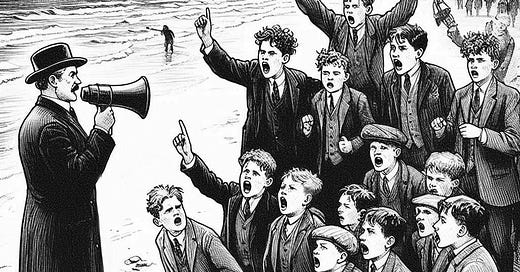Twelve Boys Rout Fascist
A sand battle on a Weymouth beach; PLUS How I made the Singular Discoveries podcast; and the Summer of George
The following story comes from the Daily Herald newspaper of Saturday, 6 August, 1938, a little over a year before the outbreak of World War II:
Twelve boys, some of them less than 10 years old, went to Weymouth beach and barracked Mr Robert Saunders, a Fascist speaker.
He ignored them, so they went away and returned with toffee tins half filled with stones.
Using the tins as rattles, they made so much noise that Mr Arthur England, a 63-year-old Weymouth magistrate and superintendent of the beach, approached to stop them.
A crowd of holiday-makers, sympathising with the children, booed Mr England and a sock filled with sand caught him behind the ear.
In the sand battle that followed, the Fascists were pelted off the beach.
About 5,000 people followed them to their car, overturned the trailer attached it, and filled the loud speaker equipment with sand.
Police brought the demonstration to an end.
Yesterday, the Fascists were removing grit from their eyes, and the police were looking for the hidden hand which conducted the boys’ “orchestra”.
Robert (Bob) Saunders was a friend and supporter of the British aristocrat and Nazi sympathiser Oswald Mosley. Saunders was a district officer for Mosley’s British Union of Fascists. Both Saunders and Mosley were interned under defence regulations during World War II. Saunders went on to take up a senior position with the National Farmers’ Union.
At the time of the “sand battle” at Weymouth, Saunders was involved in a fascist propaganda scheme in which he and other Mosley supporters sent identical letters under different names to multiple local newspapers praising the “German social system”. Saunders was outed in the newspapers as “a well-known local blackshirt leader”, and his letter was described as “so obviously merely a product of a Nazi propaganda department masquerading in this country under God knows how many names.”
A fascist leader in a British seaside town, and no milkshakes involved. ◆
With thanks to Richard Smyth, who posted this clipping on Twitter/X.
Here’s a video of the wonderful Waterstones bookshop in Newcastle upon Tyne.
How I made the Singular Discoveries podcast
In case you missed it, a bonus episode of the Singular Discoveries podcast is now available to supporters who purchased the ad-free binge and bonus package, it’s also available as a standalone instant download.
The episode features brand-new stories, plus a revealing behind-the-scenes look at the making of the podcast.
I came up with the idea for the podcast during the Hollywood strike. The Writer’s Guild was striking for better pay and deals, and the Screen Actors Guild joined them, alongside TV and radio artists.
Several of my stories have been sold to Hollywood, and if you’re lucky you might see them one day on the big screen. But, during the strike, none of my projects were getting made (and a force majeure meant some of my contracts were effectively frozen).
I completely supported the strike (which ended in September), but I wanted to do something to fill a hole in the schedules while Hollywood was on hiatus. I don’t have the resources to make a movie, but I could make a cinematic podcast. That would bring these stories to a bigger audience, and perhaps showcase their cinematic potential for when Hollywood unpaused itself.
So how did I make the podcast? A completely independent production with a negligible budget? Well, the secret behind this podcast is AI – artificial intelligence. Some of the voices you’ll hear on the podcast (including mine…) are real. But most of them, including the voice of host Victoria, are not.
They’re AI voices. Really advanced AI voices from a company called ElevenLabs. They’re so realistic that no listener I’ve heard from realised they were artificial until I told them.
It wasn’t really a secret. If you listen to the bonus episode, you’ll hear Victoria explain that she’s an AI-generated host. I didn’t mention this in earlier episodes because I wanted them to be taken at face value. I reckoned that anyone hearing about an “AI podcast” would automatically think it must be rubbish and wouldn’t bother listening to see if it actually was rubbish (which hopefully it wasn’t).
I have conflicting opinions about AI. I think it’s an incredible technology. But I also think it’s dangerous, not just in a “destroy all humans” kind of way, but in a way that threatens many of the jobs we humans do. And I’m mindful that one of the reasons Hollywood creatives went on strike was the threat of AI.
So, I was torn about using AI voices. But here’s why I did it: This podcast could not have been made without them. I didn’t have the budget to hire multiple voice actors. AI didn’t steal jobs from real actors because those jobs didn’t exist. Instead, AI has helped a creative (me) to produce and showcase my work in new ways. I think that’s good use of AI, giving a creative a leg up instead of pushing them down.
In the future, I want to work with real voice actors, musicians, sound designers, and cover artists. (I created the music, sound design, and cover art for this podcast season, with some great music by Clive Whitburn in one episode.) Hopefully, this AI-assisted podcast can help create the opportunity to make a “proper” podcast—plans for which are already underway.
So, in summary, I’m real, Victoria isn’t. I hope you’ve enjoyed this podcast series. There are some interesting irons in the fire for future projects, and as a subscriber to this newsletter you’ll be the first to hear about them.
You can find all episodes of the podcast here. ◆
The Summer of George (Wilson)
If you listen to the bonus episode of the podcast you’ll hear me mention the many George Wilsons I have written about over the past few years. At least five so far, including a professional walker or pedestrian from the 1800s, a notorious male horse thief who was actually a female in disguise, a stationmaster who was the victim of one of Britain’s most mysterious unsolved murders, a footballer from the early years of Newcastle United Football Club, and a WWI veteran who helped build the Tyne Bridge.
Over the next few weeks, I’ll be revisiting the stories of these George Wilsons and presenting the brand new story of a sixth George Wilson. So look out for bonus newsletters arriving in your email inbox to read while you’re on your summer holiday, some say vacation. If you’re not already a subscriber, you can sign up for free using the link below. And if you know someone who might enjoy a summer of George Wilson-related stories please share this with them.
Oh, just for fun, here’s another George:
More next month week! Please share and subscribe. Thanks for reading. ◆





